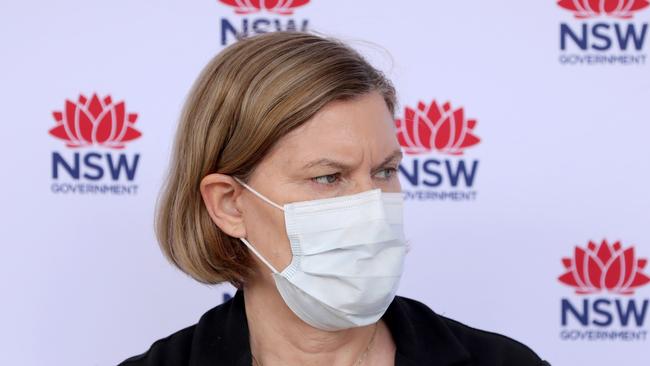New South African coronavirus mutation alarms health chiefs
Health authorities are alarmed at the arrival of the new COVID-19 South African variant in Australia, with evidence it is not only more infectious but may make current vaccines less effective.

Health authorities are alarmed at the arrival of the new COVID-19 South African variant in Australia, with evidence it is not only more infectious than previous forms of the virus but may make current vaccines less effective.
Four returned travellers to NSW have tested positive to the South African variant and are in quarantine with 16 people who accompanied them on the flight. Two other passengers tested positive for the UK variant.
NSW Chief Health Officer Kerry Chant said the precautions were necessary because the South African variant may have increased transmissibility. “That is why we are taking a very cautious approach there,” she said.
NSW recorded four new locally transmitted coronavirus cases on Friday, with the government confirming that a lockdown of the northern part of the northern beaches would be lifted at midnight on Saturday.
But it is the increasing number of COVID-19 mutations causing most concern. The British super variant, which some studies suggest is up to 70 per cent more infectious, has been detected in at least 15 Australians arriving from Britain in recent weeks.
Greater Brisbane has been ordered into a strict three-day lockdown after a cleaner at a quarantine hotel tested positive to the UK variant.
But the arrival of the South African virus also has health authorities deeply worried.
Scientists believe the new variant, referred to as 501. V2, carries a heavier viral load of COVID-19, possibly contributing to higher levels of transmission, and appears to be more prevalent among the young. However, like the UK variant, it does not appear to be deadlier or require different treatment.
Several countries have blocked flights from South Africa, with Britain banning travellers from a dozen other African countries as the variant spreads across the continent.
“I’m incredibly worried about the South African variant, and that’s why we took the action that we did to restrict all flights from South Africa,” British Health Secretary Matt Hancock told BBC Radio. “This is a very, very significant problem … even more of a problem than the UK new variant.”
The South African variant contains an unusual number of mutations that may allow the virus to better bind to and enter cells than previous variants, thus increasing transmissibility. These mutations are concentrated in the segment of the virus genome that codes for the spike protein, to which the Pfizer, AstraZeneca and Moderna vaccines build immunity.
On Friday most Australian epidemiologists gave a cautious thumbs up to tougher border control measures announced by the national cabinet to combat the emerging mutations, but some health experts argued the changes did not go nearly far enough.
The emergency meeting dramatically cut the number of overseas arrivals entering Australia, imposed pre-departure COVID tests and tightened the testing regime for quarantine workers. But UNSW adjunct professor and infectious diseases expert Bill Bowtell said Australia should take the lead from Hong Kong and stop all flights from Britain immediately. Simply halving the number of incoming passengers was ineffective, he said.
“Let’s just hope the virus is in the half that don’t come,” he said. “The virus doesn’t get these memos.
“What they’ve announced is good, but the big question you’ve got to ask is: is it good enough? And I am deeply concerned, as everybody ought to be, that failures in the quarantine administration have let at least the UK variant out into the community and that the South African variant is here.”
However, epidemiologist Tony Blakely, from the University of Melbourne gave the national cabinet full marks. “It’s very impressive. I think the states and territories and the federal government have done extremely well to get us to this point,” he said.
“The lockdown in Brisbane, that’s entirely appropriate and a no brainer — had to be done. As far as pre-testing before people get on planes — tick. Wearing masks compulsory on planes — tick. Reducing the number of people coming here — tick.”




To join the conversation, please log in. Don't have an account? Register
Join the conversation, you are commenting as Logout